Related Research Articles

David Walter Foster is a Canadian record producer, film composer, and music executive. He has won 16 Grammy Awards from 47 nominations. Foster's career began as a keyboardist for the pop group Skylark in the early 1970s before focusing largely on composing and production. Often in tandem with songwriter Diane Warren, Foster has contributed to material for prominent music industry artists in various genres since then, and is credited with production on over 40 pop hits on the Billboard Hot 100. He has also chaired Verve Records from 2012 to 2016.
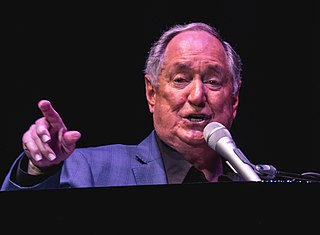
Neil Sedaka is an American singer, songwriter and pianist. Since his music career began in 1957, he has sold millions of records worldwide and has written or co-written over 500 songs for himself and other artists, collaborating mostly with lyricists Howard "Howie" Greenfield and Phil Cody.
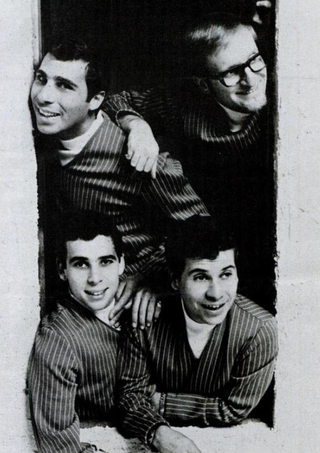
The Tokens were an American doo-wop band and record production company group from Brooklyn, New York City. The group has had four top 40 hits on the Billboard Hot 100, all in the 1960s, their biggest being the chart-topping 1961 hit single "The Lion Sleeps Tonight", which borrowed heavily from the 1939 song "Mbube" by South African singer Solomon Linda. They are also known for having Neil Sedaka as an original member, before he pursued a solo career.
"All the Way" is a song published in 1957 by Maraville Music Corporation. The music was written by Jimmy Van Heusen with lyrics by Sammy Cahn.
Skylark was a Canadian pop and rock band active from 1971 to 1973 and based in Vancouver. "Wildflower" is their biggest hit.

"Breaking Up Is Hard to Do" is a song recorded by Neil Sedaka, co-written by Sedaka and Howard Greenfield. Sedaka recorded this song twice, in 1962 and 1975, in two significantly different arrangements, and it is considered to be his signature song. Between 1970 and 1975, it was a top-40 hit three separate times for three separate artists: Lenny Welch, The Partridge Family and Sedaka's second version. The song was also adapted into multiple languages, most notably in Italian and French.
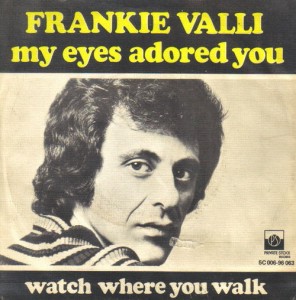
"My Eyes Adored You" is a 1974 song written by Bob Crewe and Kenny Nolan. It was originally recorded by The Four Seasons in early 1974. After the Motown label balked at the idea of releasing it, the recording was sold to lead singer Frankie Valli for $4000. After rejections by Capitol and Atlantic Records, Valli succeeded in getting the recording released on Private Stock Records, but the owner/founder of the label, Larry Uttal, wanted only Valli's name on the label. It is from the album Closeup. The single was released in the US in November 1974 and topped the Billboard Hot 100 in March 1975. "My Eyes Adored You" also went to number 2 on the Easy Listening chart. Billboard ranked it as the No. 5 song for 1975.

"Solitaire" is a ballad written by Neil Sedaka and Phil Cody. Cody employs playing the card game of solitaire as a metaphor for a man "who lost his love through his indifference"—"while life goes on around him everywhere he's playing solitaire". The song is perhaps best known via its rendition by Carpenters. Another version by Andy Williams reached number 4 in the UK Singles Chart in 1973.

"Rhythm of the Rain" is a song performed by The Cascades, released in November 1962 in the US and on January 25, 1963 in the UK. It was written by Cascades band member John Claude Gummoe. On March 9, 1963, it rose to number 3 on the Billboard Hot 100, and spent two weeks at number 1 on Billboard's Easy Listening chart. Billboard ranked the record as the number 4 song of 1963.
"Love Will Keep Us Together" is a song written by Neil Sedaka and Howard Greenfield. It was first recorded by Sedaka in 1973. The brother-sister duo Mac and Katie Kissoon also recorded a version in 1973. American pop duo Captain & Tennille covered it in 1975; their version became a worldwide hit.
"Stupid Cupid" is a song written by Howard Greenfield and Neil Sedaka which became a hit for Connie Francis in 1958.
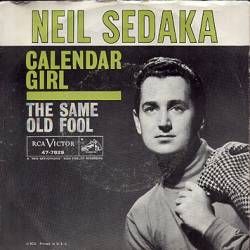
"Calendar Girl" is a song by Neil Sedaka. The music was composed by Sedaka and the lyrics by Howard Greenfield. Released in December 1960 as a single, it was a hit single for Sedaka, peaking at No. 4 on the US charts, No. 3 in Australia, and No. 1 on the Canadian and Japanese charts.
The following is a comprehensive discography of Neil Sedaka, the American singer.

The Other Side of Me is the thirty-fifth studio album by American pop singer Andy Williams, released in the summer of 1975 by Columbia Records and including the 1973 recording of "Solitaire" from his album of the same name alongside 10 original recordings, four of which were also by "Solitaire" composer Neil Sedaka. After unsuccessful attempts to leave behind the formulaic album genre of easy listening covers of pop hits, The Other Side of Me offered a compromise by filling half of the sides with material that was popularized by other artists and the other half with either new or obscure selections.

Emergence is an album by the American pop singer Neil Sedaka, released in September 1971. The album was issued on the RCA Victor label, marking a short-lived reunion between Sedaka and RCA since RCA dropped him from their label at the end of 1966. Emergence was released in some areas on Kirshner Records, Don Kirshner's private record label. The album was not a sales success, but has acquired a cult following among Sedaka's fans. Four of its songs made their way onto 45 rpm singles releases: "I'm A Song " b/w "Silent Movies" and "Superbird" b/w "Rosemary Blue". Of all the albums Sedaka has recorded, he considers Emergence to be his favorite.

Steppin' Out is a 1976 album containing the works of Neil Sedaka. In America it was the third and final album of a trilogy of albums issued by The Rocket Record Company. Outside America Steppin' Out was issued on the Polydor label. In 1998, the Varèse Sarabande label reissued Steppin' Out and included four bonus tracks.

"Where the Boys Are" is a song written by Neil Sedaka and Howard Greenfield for, and first recorded by, Connie Francis as the title track of the 1960 movie by the same name in which she was co-starring.
"Workin' On a Groovy Thing" is a song written by Neil Sedaka and Roger Atkins which had its highest profile as a 1969 hit single by the 5th Dimension.
Craig Scott is a New Zealand pop singer who had several commercially successful singles in the 1970s.
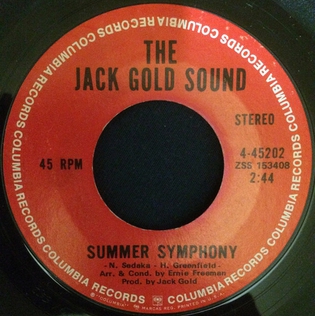
"Summer Symphony" is a song written by Neil Sedaka and Howard Greenfield. It was arranged by John Farrar and produced by Pat Aulton. The song was used on the album Sounds Of Sedaka, a UK issue of the 1969 album, Workin' On A Groovy Thing recorded for Festival Records of Australia.
References
- ↑ Neil Sedaka, Emergence Retrieved June 15, 2015
- ↑ "RPM Top 100 Singles - November 20, 1971" (PDF).
- ↑ Dr. Music, Dr. Music Retrieved June 15, 2015
- ↑ Dr. Music, "One More Mountain to Climb" single release Retrieved June 15, 2015
- ↑ Craig Scott, "One More Mountain to Climb" single release Retrieved June 15, 2015
- ↑ Skylark, 2 Retrieved June 15, 2015
- ↑ David Soul, David Soul Retrieved June 15, 2015